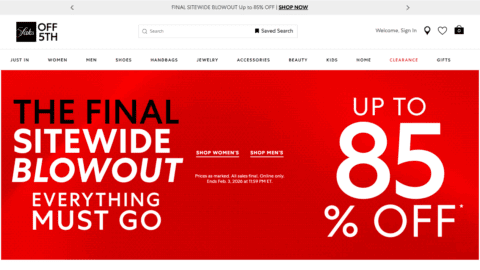JCPenney will close 27 stores this year, including 18 full-line department stores and nine home and furniture stores. The department store retailer announced the closures as it revealed a 4% decline in same-store sales during the holiday quarter, an even bigger dip than the 3.5% in November and December alone.
While Q4 net income reached $75 million, or $0.24 per share, JCPenney bled out money yet again for the full year, seeing net losses of $255 million. JCPenney has been in the process of trimming its store count in recent years as it seeks to maximize the value of its real estate. The retailer closed 138 stores in 2017 and eight more in 2018, and now has approximately 800 stores left in its portfolio — but that’s likely still too many.
Trent Kruse, Treasurer at JCPenney, told analysts in an earnings call that the company hasn’t ruled out more store closures beyond 2019. “I think it’s safe to assume that as you roll into 2020 and future years, it’s likely to see some continuation of that effort,” Kruse said. “[It’s] hard to say now, but I think that’s a fair read.”
The stores identified for closure either require significant capital or generate minimal cash flow relative to JCPenney’s remaining real estate monetization opportunities, according to a company statement. The more than 1,000 employees impacted by the closings will receive separation benefits including assistance finding another job, such as resume writing.
In addition to closing its stores, JCPenney will end a short-lived men’s apparel subscription service venture with Bombfell, an online personal stylist. The service, launched in December 2017, offered JCPenney private label and men’s clothing brands to people who signed up for regular apparel shipments.
Bombfell sends customers five clothing items, handpicked by a stylist, for them to try on in the comfort of their own home. JCPenney shoppers then had seven days to decide which items they wanted to buy and which they would send back.
Customers who signed up for the men’s subscription service paid a $20 styling fee with each order that included a dedicated personal stylist plus free shipping and returns. The fee was applied toward the cost of any clothing they kept.
The move is the latest by JCPenney to scale back to the basics under the leadership of new CEO Jill Soltau, who inherited a retailer with nearly $4 billion in unpaid long-term debt as of her hiring. If there’s any positives from Soltau’s first holiday season, it’s that JCPenney reduced inventory 13.1% from last year and still has total liquidity of $1.9 billion.
The retailer has since exited major home appliance sales and limited furniture sales to its e-Commerce site and at select Puerto Rico stores. In the earnings call, JCPenney revealed that appliances only amounted to 2.7% of sales at JCPenney and represented a drain on operating profit.












